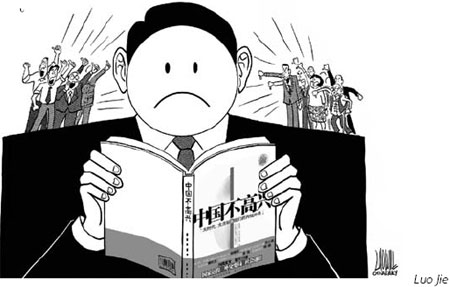
|
OPINION> OP-ED CONTRIBUTORS
 |
|
With things unpleasant, can't we be unhappy?
By Xiong Lei (China Daily)
Updated: 2009-04-18 08:02 The ongoing debate over China is Unhappy is as amusing and controversial as the book itself. Contrary to the claims of a section of the media that it is a market failure, the book is already in its eighth edition. Jiangsu People's Publishing House first published the book in March. And in just about a month it has sold about half a million copies, says Huang Jisu, one of the book's five authors who have since been dubbed "grassroots intellectuals". The book's sales figure has not been verified but that would hardly make a difference. What is really intriguing is that commentaries published in some influential Chinese newspapers seem to dismiss the book as "too extreme and nationalistic", but netizens and scholars not associated with those publications have openly supported the authors' views. Many netizens have even criticized the critics of the book on online BBS or in their blogs. That means people who try to gauge public opinion on an issue by reading those newspapers, or people who assume that they mirror society's view in totality, could be misled. It is fascinating to see that our opinions have become so divergent that the print media and their well-established columnists no longer have the capability to represent them truthfully. One has to probe beneath the surface to feel the pulse of the people and their divergent and even opposing ideas. Since I've read only parts of the book, I'm not in the position to review the collection of essays. But the little I have qualifies me to challenge some of the criticisms that are puzzling if not unreasonable. For instance, one critic characterizes the unhappiness with some elites being deferential to Western powers, and called it a "virus" that is "poisoning our nation's psychology". "A great nation is just like a great person who is psychologically strong," says the critic. "No matter how bitterly a person is hurt, he or she would not lose the ability to love, or allow the sense of hatred or revenge to overwhelm him/her." It would be unwise to go in for a tit-for-tat with the critic. But I certainly cannot become a "great" human being if I "love" those who have hurt me, although I've never considered myself psychologically weak. And I'm sure that I'm not alone in having such a feeling. There surely are things that infuse anger in us. They may range from forces that are trying to separate Taiwan, and the Tibet and Xinjiang Uygur autonomous regions from China and those who attempted to mar the Beijing Olympic Games to people auctioning Chinese cultural relics that were looted from the country. Some unpleasant things can be seemingly trivial. I don't know if European tourists have to submit their bank accounts' certificates and have a percentage of their deposits frozen for a certain period to get a visa to China. But that is what we Chinese have to do to get a tourist visa for a Western European country. And then you have to leave the prints of all your eight fingers and two thumbs with the US consulate to get a visa to the "Land of Dreams" and "Pastures of Plenty". I wonder if anyone regards such treatment as pleasant. In many cases, we can only feel unhappy about unpleasant encounters. Yet we are told that the feeling of unhappiness is "dangerously nationalistic" and "poisoning". I'm not jingoistic, but will somebody please tell why we can't be unhappy with irritating encounters and experiences? Leaders of some Western countries love to criticize our human rights record. But surprisingly their representatives never hesitate to encroach upon our rights to privacy and free movement when we try to get a visa to visit their countries. They set as many barriers as possible in our path to what they call "Europe without barrier". One can argue that such obstacles were created because some Chinese migrated to those countries illegally. That may be true, but it is also true that most Chinese tourists are law-abiding citizens and would never think of migrating illegally. So why should someone encroach upon their rights to privacy? Isn't this against the Western notion of "presumption of innocence", which has now been introduced into our legislation? On the other hand, even though I'm absolutely against illegal emigration and immigration, I think Western countries should look into their discriminatory immigration and visa policies. It is strange to see those who extol freedom and democracy at the top of their voice are brazen enough to deprive many ordinary people from being part of their "world of freedom" and have the value of their labor maximized. Globalization has so far meant only free influx of multinational corporations to countries where labor is cheap and thus can be exploited to the maximum to multiply their capital. But we hit an impregnable wall when it comes to free flow across the world of people eager to maximize the value of their labor. People certainly have the right to be unhappy with such inequity. It is understandable, too, that some people demand reform of the existing political and economic systems of our global village. That is not to say China should be a world leader after the reform. At best, our country should be a contributor to international democracy. But if things constantly make us unhappy, I'm afraid nationalism - irrespective of how "dangerous" and "poisoning" it may sound to elitists' ears - would acquire solid ground to prevail in this land. The author is a council member of the China Society for Human Rights Studies.
 (China Daily 04/18/2009 page4) |